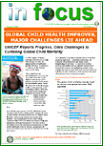|
BIOMEDICAL AND ENVIRONMENTAL EXCHANGE PROGRAM
The major health concerns worldwide demand a cadre of professionals with up-to-date knowledge and training for addressing major health and environmental challenges throughout the world. The Center for Communications, Health and the Environment attempted to address this need partially through its Biomedical and Environmental Exchange Program, conducted from 1990-1998. The program aimed to provide young biomedical and environmental health scientists and other professionals from Central Europe, the Newly Independent States (NIS), and India with short- to medium-term first-hand experience working with the latest technology in their respective fields of interest at CECHE's partner institutions, primarily in North America. With support from anonymous philanthropic sources, grants from the Central European Development Corporation, Ronald Lauder, and in-kind support from participating North American and European host institutions, this program sought to create a cadre of well-trained leaders in the region and to foster collaboration among them, their institutions, and their American counterparts. In1996, a new grant from the Trust for Mutual Understanding especially facilitated exchanges between scientists from non-metropolitan areas of CEE/NIS and leading North American institutions. Approximately ten scholars per year participated in individual, short-term (6-8 weeks) collaborative research at one of the three U.S. institutions:

Environmental pollution: Central Europe's dark dawn
Primary study emphasis was placed on preventive aspects, such as environmental risk assessment, monitoring, and policy; and priority areas which can be realistically implemented and put in to practice upon the scholar's return to his/her home country. Furthermore, each of the three US institutions annually sent one scientist, an expert in environmental and occupational health on a brief advisory and consultative visit organized by the counterpart institution in CEE/NIS. These visits incorporated follow-up to the collaborative research projects begun in the US, the sharing of methodology and techniques, as well as graduate-level seminars and workshops on topics of general interest, such as environmental toxicology, and carcinogenesis. Over 8 years, the Biomedical and Environmental Exchange Program trained over 100 professionals from Bulgaria, Croatia, the Czech Republic, Hungary, India, Poland, Russia, Yugoslavia, Romania, Slovakia and the US at European, Canadian, American and Indian institutions. In 1998, the program was assessed and concluded in favor or a greater perceived need—training in the use of mass media for public health education. |
|
|||||||||||
Questions? Comments? Concerns? E-mail CECHE at CECHE@comcast.net Go back to the CECHE home page Go back to the CECHE home page
|

